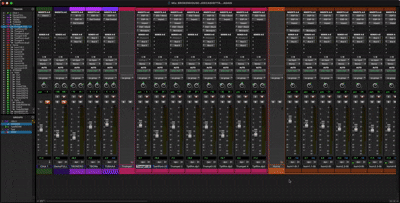
Making Broken House Come Alive
Mixing is the process by which all the work of recording really comes together. It's the stage where unprocessed audio becomes a coherent, finished musical work. Mixing Broken House for my senior capstone project was an adventurous yet demanding process that balanced accuracy with creativity, all while maintaining everything on schedule.

Up First: The Instruments
I always start with a very rough baseline using a basic volume fader and pan knob mix. This helps me to sense the balance of the music before delving into more exacting treatment. Then I go through and gain stage and edit each track—not just aligning everything with the click track but also ensuring each instrument lines up with each other. Timing is essential!
From there, I EQ and add compression to fit everything into its correct space from the lowest instrument voices up. I start with the percussion once the melodic instruments are tuned to ensure every strike feels strong but under control. Following this, I work on volume automation—lots and lots of which constitute one of the most time-consuming yet worthwhile aspects of my process. This guarantees that, independent of the song's dynamics, every instrument blends naturally.
Once the volume automation is locked in, I explore reverb and delay sends, varying and automating their levels to produce depth and space without washing out the track.
Vocals: Heart of the Song
Being a vocalist myself, I always spends more time on the vocals to ensure they sparkle while yet fittingly blending in the mix. I start with gain staging and timing tightening, removing any extraneous breaths, mouth sounds, or other odd sounds that don't fit. One of my pet irritations is Strong S sounds pinging through the compressor; thus, I make sure to manually modify those before compressor even touches them.
Then follows my best friend: Melodyne. The secret is, though, I merely change what needs to be changed. I let it go alone if the vocalist is already in tune and matches the instrumental harmonically. Ensuring everything fits the chord sequence without sacrificing the human feeling in the performance is my primary objective. I include manual sibilance control, varying the volume of strong sounds instead of depending solely on a de-esser.
Final Touches
Once everything is set, I pull it all together, making sure every cut has appropriate fades, every track that requires reverb gets it, and all the minute nuances that beginning mixers usually overlook are included. This last mix guarantees a clean, professional mix that increases the emotional weight of Broken House, so preparing the track for mastering.
Challenges along the way
Maintaining everything on schedule while ensuring my client was happy presented one of the toughest obstacles during this process. Mixing is about making creative judgments sometimes involving tiresome, minute details, not only about making things sound good. Though not every artist enjoys delving deeply into the little changes, such elements are what really bring the finished work to life.
After all the long hours of automating, adjusting, and polishing, the song is mixed—ready to enter the last phase: mastering. Though mixing Broken House was an adventure, having the finished product come to life made every difficulty worthwhile.




